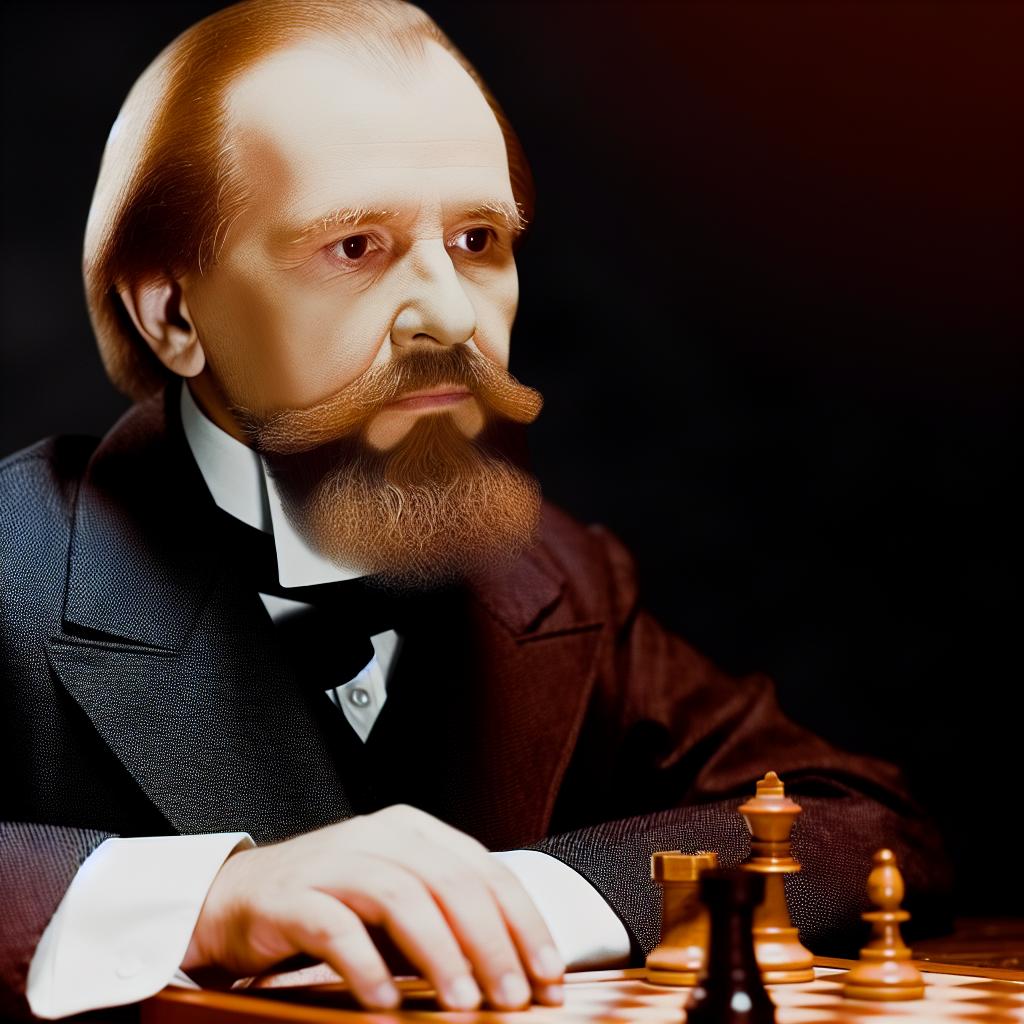Contents
“`html
Wilhelm Steinitz: The Father of Modern Chess
Wilhelm Steinitz, born on May 17, 1836, in Prague, played a pivotal role in transforming chess into the analytical discipline it is today. As the first official World Chess Champion, his influence remains evident in the strategies and theories employed in the game.
Early Life and Career
Steinitz began learning chess at the age of 12 and quickly demonstrated a remarkable affinity for the game. His early exposure to chess, during his formative years, laid the foundation for a career that would revolutionize how people approach the game. By 1862, he moved to London to participate in his first international tournament. Though he placed sixth, this event marked the beginning of his rise in the chess world. The tournament was a crucial moment not only for Steinitz but also for the broader chess community, as it showcased his potential to challenge established norms.
His aggressive playing style during the early stages of his career won him significant acclaim. This approach was in line with the romantic style of chess prevalent during his time, which favored bold, tactical play and dramatic sacrifices. However, as he matured as a player, Steinitz started advocating for a more strategic, positional approach to chess, a shift that would define his legacy. This transition marked a turning point in chess history, as he introduced concepts that emphasized careful planning and long-term strategic vision over immediate tactical gains.
Theories and Contributions
Wilhelm Steinitz is often referred to as the founder of modern positional play, and his contributions go beyond the confines of the chessboard. His theories emphasized the importance of understanding chess as a structured battle, where control of the board and the placement of pieces are crucial. He advocated for principles such as the importance of pawn structures, the creation of strong and weak squares, and the accumulation of small advantages. These principles transformed chess from a game dominated by flair and intuition into one where systematic analysis and strategic thinking took center stage.
These ideas were revolutionary at the time and were initially met with skepticism. The chess community was slow to embrace notions that deviated from the accepted norms. However, Steinitz’s success in tournaments began to validate his approaches. He demonstrated time and again that his methods could withstand the test of rigorous competition, proving the efficacy of his theories. His theoretical contributions laid the groundwork for future chess strategies and are still taught to players of all levels today.
Reign as World Chess Champion
Steinitz won the first official World Chess Championship in 1886, defeating Johannes Zukertort. This victory was a landmark event in the chess world, establishing Steinitz as the preeminent player of his time. As the first official World Chess Champion, his methods and practices were scrutinized, dissected, and eventually embraced by peers and successors alike. He held the title until 1894, when he was defeated by Emanuel Lasker. Steinitz’s encounter with Lasker was not just a battle of skills but also a clash of ideologies, with Lasker’s dynamic style challenging Steinitz’s positional philosophy.
During his reign, Steinitz’s methodical style was often contrasted with the more dynamic approaches of his contemporaries. While many of his peers preferred immediate confrontations and the allure of spectacular tactics, Steinitz’s strategies were built on patience, fortification, and incremental progress. Despite losing the championship, he continued to compete at a high level and remained a formidable opponent until the end of his career. His perseverance in the face of defeat demonstrated the resilience and dedication that defined his life in chess.
Legacy
Wilhelm Steinitz’s impact on chess is undeniable. His shift towards a scientific and logical understanding of the game has influenced countless players, including some of the strongest grandmasters in history. By introducing a disciplined approach to the game, Steinitz transformed chess into a form of intellectual sport that required serious study and preparation. His principles paved the way for subsequent generations of players who would build upon and refine his ideas.
Today, Steinitz is remembered not only as a world champion but also as a pioneer who changed the course of chess history. His contributions have been immortalized in chess literature, where his games and analyses serve as essential learning material for aspiring players. The lessons derived from Steinitz’s approach continue to shape the foundational strategies of chess instruction worldwide. For those interested in further exploration, detailed accounts of his games and theories are available in various chess archives and literature. These resources offer an invaluable glimpse into the mind of a player who was not only a brilliant strategist but also a visionary thinker whose innovations resonate to this day.
The depth of Steinitz’s work exemplifies the idea that chess, much like life, requires one to understand not only the immediate circumstances but also the long-term consequences of every move. His legacy is a testament to the profound impact that one individual can have on an entire discipline, forever altering its trajectory and enriching its tapestry with enduring wisdom. For more on Wilhelm Steinitz, various specialized chess forums and resources offer in-depth analyses and discussions on his life and work. You can visit Chess.com for an engaging exploration of his contributions.
“`

